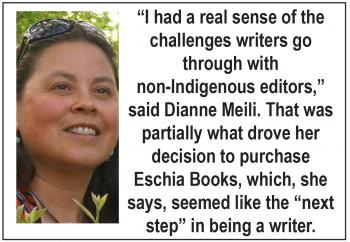Image Caption
Summary
Windspeaker.com Contributor
Dianne Meili has no doubt that an Indigenous mentorship program, like the one now being offered by the Book Publishers Association of Alberta, would have benefitted her five years ago before she purchased Stony Plain-based Eschia Books.
She also has no doubt that had the association been able to work with mainstream publishers to make them understand the importance of hiring Indigenous editors, it would have benefited her as a writer.
“I had a real sense of the challenges writers go through with non-Indigenous editors,” said Meili, a Cree Metis journalist, book writer, and publisher, who recalls the “learning curve” both she and her editor faced.
In a historical fiction novel Meili wrote, which involved magical surrealism and a scene where someone with medicine power was able to dissolve the metal blade of a knife to the time where the earth “was steam and hadn’t cooled yet,” she found herself bargaining with her non-Indigenous editor as to when in the plot that scene should be included.
“She said you have to gain the trust of the reader in your character and what’s happening before you can just put something like that in. She had a point, yet Indigenous readers would probably not need all that time. It’s very interesting when you do look at different worldviews.
“We struck a bit of a compromise. I did understand that probably most of my readers would be non-Indigenous so I understood what she was telling me,” said Meili.
From experiences like this, she came to understand the need for Indigenous people to both own publishing companies and to be editors in mainstream publishing houses.
That was partially what drove her decision to purchase Eschia Books, which, she says, seemed like the “next step” in being a writer.
“I thought this was a real opportunity for me to give back, and since I had so much experience, been to so many Indigenous communities in Alberta, I knew that there were so many grassroots writers out there who needed a platform and probably somebody to be a little more of a developmental editor,” she said.
It’s a need the Indigenous mentorship program, which will see five Indigenous interns paired with five publishing companies for a one-week period, is hoping to meet.
The mentorship program is in response to the Writing Stick: Sharing Indigenous Stories conference the book publishers’ association held jointly with the University of Alberta in June 2017. The goal of that conference, which Meili attended, was to explore principles and guidelines for publishing and editing materials by Indigenous writers and about Indigenous peoples.
“It became very apparent that there is a gap in our publishing industry; the gap being an underrepresentation of Indigenous people involved in the publishing industry.
“This mentorship program was borne out of that, and aims at giving access to the industry to Indigenous people who have an interest in book publishing,” said Kieren Leblanc, executive director with the association and program chair for the Writing Stick conference.
Funding left over from the conference will be put toward the mentorship program, which includes $500 for each participant to cover their time and expenses. The conference received $5,000 from the Alberta Media Fund.
“Right now, that the publishing industry is primarily white is quite a well-known fact. As we saw through the Writing Stick (conference), we need authenticity that can’t really be found without Indigenous involvement,” said project coordinator Patricia Veldstra.
The first of two deadlines for applications from those who want to be mentored has passed and response has been “a good start,” said Veldstra. The end of February has been set as the second deadline for applications.
“Since this is the first time we’re doing this program, we’re really open in how it will play out… because everyone has different goals,” she said. “The dates and content of the mentorships are open to discussion between the mentees and host publishers.”
Applicants will be selected first and then matched with publishers, based on location and what the applicant is hoping to accomplish in the residency.
As far as Meili is concerned, the one-week timeframe is perfect. Having participated in a five-day long Aboriginal Editors Circle, a program run by the Saskatchewan Arts Board in June 2014, Meili says it was just enough time to not make everything she learned overwhelming.
“While the actual working time is only one week, we are hoping that the program will encourage continued collaboration between the publishing industry and Indigenous communities,” said Veldstra.
The association plans to run a second phase of the program beginning April 1.
Opportunities like this, and the Writing Stick conference, are valuable, said Meili, as a means to “create bridges” and build understanding. Indigenous editors within mainstream publishing houses are part of that work.
“Having somebody within the staff of a huge publishing company I think would be a step forward. (It) is to create that awareness that there is a difference in worldviews and perhaps a difference in the way a writer will present something. To have it edited out is just a shame,” said Meili.
Since purchasing Eschia, Meili has published 12 titles, all of which have been Indigenous-authored. Eschia Books are distributed by Lone Pine Publishing. Authors comes from across Canada.
Eschia sells its books in grocery stores and hardware stores outside of the urban setting, making them more accessible to Indigenous people who live in rural areas.
Meili believes that the discerning non-Indigenous reader will be attracted to books about indigenous people or Indigenous subjects that are written by Indigenous people and published by Indigenous presses.
There are less than a dozen Indigenous publishing houses across Canada.

